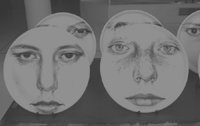Carl: And there’s a study been done that shows you young people have no concentration, you don’t have the attention span to finish a book.
Jerry: A study, huh?
Carl: A scientific study, mind you.
Jerry: Hmm.
Carl: And you know why? It’s because of Google. You go hop, hop, hop all over the place and haven’t the patience to pursue an argument to its logical concussion.
Jerry: I think you mean conclusion.
Carl: That’s what I said.
Jerry: Not so sure. Last night I was watching an old documentary, The Living Planet, and I got interested in lichens and cobras and who made it, David Attenborough, so I googled away and found his brother Richard Attenborough who directed Ghandi and pretty soon I felt I’d caught up on a lot of stuff.
Carl: You see, a whole of lot unrelated facts.
Jerry: Well twenty years ago, I’d have gone to sleep watching the documentary and finding out all that stuff would have needed a trip to the library and I wouldn’t have had time to go and I wouldn’t therefore have followed up and deepened and widened what I learned from the documentary.
Carl: Still say you only get trivia from Google.
Jerry: Depends. I can give other studies that show young doctors get a broader knowledge from Internet delivered materials with lots of links than long linear lectures. It’s a different generation and they learn differently.
__________
Voiceover
An article entitled "Is Google Making Us Stupid?" has appeared in the July August 2008 issue of The Atlantic Monthly written by Nicholas Carr. It’s worth reading despite its conspiracy-theory flavor, it’s also an intriguing idea, although as the author cautions, “anecdotes alone don’t prove much.”
And that is how many such discussions, like those Carl and Jerry are engaging in, progress. Anecdote countered with anecdote.
Data is of course crucial but the hypotheses driving such studies are preceded by and formulated through introspection. It all begins with anecdotes.
...













1 comment:
Hello, this reminds me of a short essay or article Umberto Eco wrote some time ago about how the PHOTOCOPIER had adversely affected his productivity and depth w.r.t. research. Similar issues were explored. As with any technology, whether its construed as neutral, negative, or beneficial is dependant largely I think on the user's ability to manage it, which in turn depends on a whole other kettle of bonito, such as that person's ability manage one's own life.
Post a Comment